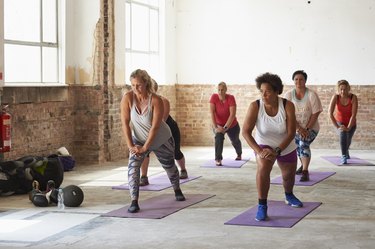
We all know that regular exercise helps keep our bodies healthy — but did you know that includes your hair? Regular exercise may help prevent some forms of hair loss because it boosts general health as well as circulation.
"The condition of your hair is often a reflection of the overall health of your body," says Jerrold Bass, a Fort Lauderdale, Florida-based master haircutter with three decades of experience. Bass recommends a non-sedentary lifestyle, drinking lots of water and taking steps to reduce stress as ways to promote scalp and hair health.
Here are a few other things to keep in mind when it comes to exercise and hair loss.
Don't Overdo It
There's no evidence that exercise causes hair loss. But when serious athletes fail to properly address their nutritional needs, or when regular folks try to drop a significant amount of weight in a short period of time, the shock to the system can have — ahem — hairy repercussions.
"Crash diets are detrimental and can reflect in hair health," says Lee Cotton, RDN, in Stuart, Florida. "Over-exercising and not providing the body with the fuel needed can lead to hair loss or brittle hair," she adds. So, consuming a balanced diet rich in macronutrients (meaning protein, fat and carbohydrates) and micronutrients (vitamins and minerals) after working out is key.
Extreme weight loss, unhealthy changes in diet and iron deficiency can all trigger Telogen Effluvium (TE), a condition in which hair follicles go into a resting phase prematurely and shed hair, according to Harvard Medical School. Female athletes are at especially high risk for being iron deficient. TE shows up as thinning hair all over the scalp. This shedding might not be even, with some areas of the scalp losing more hair than others.
Insufficient protein to fuel your workouts can be another cause of hair loss, according to the American Academy of Dermatology (AAD). Cotton concurs: "A lack of protein will slow hair growth and strands may become weaker. Protein is essential because hair is made of protein."
Read more: Super Simple Ways to Master Your Macronutrients
Protect the Hair You've Got
Even if you're not exercising to an extreme, a moderately active lifestyle still may come with a threat to strong locks: sunlight. According to the Cleveland Clinic, the outer layer of the hair shaft, called the cuticle, can sustain damage from prolonged exposure to the sun's UVA and UVB rays. It can do a number on your strands, possibly resulting in dry, discolored, thinning and frizzy hair.
If you're a runner or outdoor exercise enthusiast, protect your hair from the sun by wearing a hat or scarf. If your hair is thinning, the AAD suggests applying sunscreen to your scalp. Several brands of conditioner and spray-on sunscreen — like L'Oreal's EverPure UV Protect Spray — are formulated especially to protect against UV damage. And, of course, staying in the shade as much as possible limits your exposure to those harmful rays.
Read more: The 12 Best Foods for Healthy Hair
Swimmers get a double whammy — sun exposure plus salt water and/or chlorine. Too much exposure to pool chemicals, especially chlorine, can strip the skin and hair of natural oils, and dry hair is more prone to break and split. Public pools are worse than home pools, generally, since they typically have higher levels of chlorine as mandated by public health regulations.
The solution is pretty simple, though: Wash your hair after swimming and, if you can't shampoo, at least rinse as soon as you get out of the pool or ocean, AAD suggests. Wearing a swim cap is ideal, as it protects your hair from both the sun and water's effects.
- Harvard Health Publishing: "Telogen Effluvium"
- American Academy of Dermatology: "Hair Loss"
- American Academy of Dermatology: "How to Apply Sunscreen"
- Cleveland Clinic: "Best Ways to Protect Your Hair From Sun Damage"
- American Academy of Dermatology: "How to Stop Damaging Your Hair."
- Hairlossexpert.co.uk: Protect Your Hair Whilst Swimming
Is this an emergency? If you are experiencing serious medical symptoms, please see the National Library of Medicine’s list of signs you need emergency medical attention or call 911.